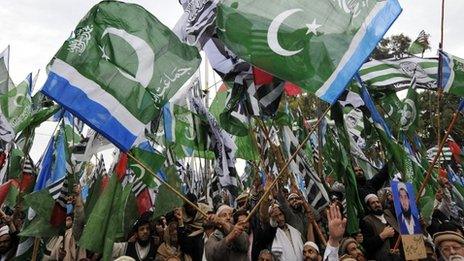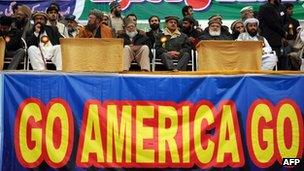Pakistanis hard-line groups stage Islamabad rally
- Published

There were repeated denunciations of America at the rally
Pakistanis from religious and hard-line groups have taken part in a rally in the capital, Islamabad.
Speakers denounced US intervention in Pakistan, and protesters chanted anti-American slogans.
The protest was organised by Defence of Pakistan, a coalition of about 40 mostly extremist parties, including some that are banned as terror groups.
The authorities stopped several extremist leaders linked to Defence of Pakistan from attending.
They include Hafiz Saeed, who heads the the Jamaat-ud-Dawa group, widely seen as a front for the Lashkar-e-Taiba militant group blamed for the 2008 Mumbai attacks in India. Jamaat-ud-Dawa denies it operates as a front for militancy.
The BBC's Orla Guerin who attended the rally says it was held under the government's nose in one of the busiest districts of the capital, only about 10 minutes' drive from parliament.
Our correspondent says the authorities made no attempt to stop it, instead blocking the traffic so that the event could take place.
On a stage next to two black-clad gunmen, successive speakers delivered radical messages. One called for every child in Pakistan to join the jihad, or Holy War.
'In pieces'
"Today, we have gathered here to raise a voice of protest against US intervention in Pakistan," said one cleric, Maulana Sami ul-Haq, told the AFP news agency.

The rally is the latest in a series of gatherings in the run-up to Pakistani elections
"Our protest is against the possible resumption of Nato supplies, US and Indian occupation and to strengthen the country's defence."
He accused the US in particular of wanting to "break Pakistan into pieces", referring to a resolution sponsored by three US congressmen calling for self-determination in the insurgency-torn south-western province of Balochistan.
Also attending the rally was former ISI intelligence head Hamid Gul, who is alleged to have played a role in supporting mujahideen fighters against Soviet troops in Afghanistan, groups that eventually gave rise to al-Qaeda and the Taliban
Correspondents say Mr Gul's presence has fuelled suspicions that elements of Pakistan's security establishment covertly back Defence of Pakistan to exert pressure on the government over its ties with the US.
Mr Gul has long denied that he has any links with insurgents.
Defence of Pakistan uses Twitter and Facebook to promote its message. It was set up after US air strikes killed 24 Pakistani soldiers on the Afghan border in late November, which saw Pakistan shut the border to Nato supplies.
The coalition has already attracted large crowds at other rallies across the country in the run-up to general elections, which some observers believe could be called later this year.
The fact that banned groups have held another high-profile rally - albeit a smaller one than usual - will worry the Americans.
- Published31 January 2012
- Published3 January 2012